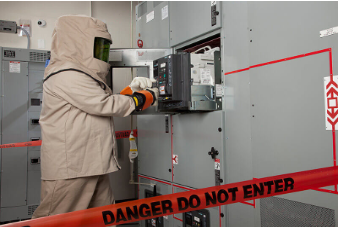

Electricity is an essential part of modern living and a critical part of university operations. Electricity, while vitally important, also presents a variety of hazards. These hazards can be severe and life-threatening. Knowledge of these hazards and how to avoid and control them must be taken into consideration when using electrically powered equipment, tools, or appliances, or when performing work on or near electrical equipment.
Examples of electrical hazards include shock, electrocution, electrical fires, burns, explosions, and arc flashes. Electrical incidents resulting from these hazards can also cause disruptive and costly power failures to campus buildings, equipment, and infrastructure.
Following the electrical safety requirements and guidelines that have been established at UMBC can ensure that electrical hazards and incidents are avoided.
Requirements For Performing Electrical Work:
- Only trained, qualified employees are permitted to perform any service or repairs to electrical equipment or components of the UMBC electrical system.
- As a general rule, all work performed on or near electrical equipment or components of the UMBC electrical system requires that the associated equipment be de-energized (using Lockout Tagout) and placed in an electrically safe work condition prior to work being performed.
- Electrical equipment shall always be assumed energized until tested and verified for absence of voltage.
- All electrical work shall be performed in accordance with OSHA, NFPA, and other applicable regulations and industry standards.
- Always utilize the necessary personal protective equipment, use the appropriate tools and equipment, such as insulated tools, and wear the appropriate attire when performing any electrical work.
General Electrical Safety Requirements:
- Do not overload electrical outlets, power strips, or circuits.
- Space heaters are not permitted in any UMBC building or facility unless issued by Facilities Management or Residential Life.
- Do not use any electrical appliance, device, tool, or machine for any purpose other than what its intended use.
- Storage within 3 feet (36 inches) of electrical panels is prohibited.
- Storage is prohibited in all electrical rooms or closets.
- Do not remove or tamper with any panels, guards, or protective enclosures of electrical generation, distribution or transmission equipment, or of any electrical tools, machines, or appliances, unless specifically qualified and authorized to do so.
- Regularly inspect electrical cords for signs of damage, fraying or other wear.
- Cord and plug equipment must either be grounded or double-insulated.
- Only use three-prong (grounded) electrical outlets and use GFCI outlets (or GFCI-rated extension cords) in wet or moisture prone areas.
- Keep electrical cords away from heat, oil, and sharp objects.
- Always unplug electrical equipment or appliances by the plug, do not pull or yank the cord out from the socket.
- Do not remove the grounding prong from a plug to fit a two-prong outlet.
- Extension cords may not be used as a substitute for permanent wiring and are not permitted to be daisy chained, spliced, or run through walls or ceilings.
- Do not carry or hang electrical tools or devices by their cords.
- Do not use metal ladders near electrical equipment, use only non-conductive ladders such as fiberglass.
- Do not perform any activities within 10 feet of energized power lines.
For more specific information on electrical safety requirements and safe work practices, please review the UMBC Electrical Safety Written Plan. There are additional appendices that accompany the Written Plan and are listed below for reference.